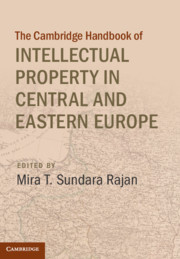11 results
Contributors
-
- Book:
- Cambridge Handbook of Intellectual Property in Central and Eastern Europe
- Published online:
- 11 June 2019
- Print publication:
- 13 June 2019, pp xiii-xvii
-
- Chapter
- Export citation
Acknowledgements
-
- Book:
- Cambridge Handbook of Intellectual Property in Central and Eastern Europe
- Published online:
- 11 June 2019
- Print publication:
- 13 June 2019, pp xxix-xxxi
-
- Chapter
- Export citation
Index
-
- Book:
- Cambridge Handbook of Intellectual Property in Central and Eastern Europe
- Published online:
- 11 June 2019
- Print publication:
- 13 June 2019, pp 424-446
-
- Chapter
- Export citation
Tables
-
- Book:
- Cambridge Handbook of Intellectual Property in Central and Eastern Europe
- Published online:
- 11 June 2019
- Print publication:
- 13 June 2019, pp xii-xii
-
- Chapter
- Export citation
Contents
-
- Book:
- Cambridge Handbook of Intellectual Property in Central and Eastern Europe
- Published online:
- 11 June 2019
- Print publication:
- 13 June 2019, pp ix-x
-
- Chapter
- Export citation
Figures
-
- Book:
- Cambridge Handbook of Intellectual Property in Central and Eastern Europe
- Published online:
- 11 June 2019
- Print publication:
- 13 June 2019, pp xi-xi
-
- Chapter
- Export citation
1 - General Introduction – Intellectual Property in Central and Eastern Europe:
-
-
- Book:
- Cambridge Handbook of Intellectual Property in Central and Eastern Europe
- Published online:
- 11 June 2019
- Print publication:
- 13 June 2019, pp 1-15
-
- Chapter
- Export citation
Dedication
-
- Book:
- Cambridge Handbook of Intellectual Property in Central and Eastern Europe
- Published online:
- 11 June 2019
- Print publication:
- 13 June 2019, pp v-vi
-
- Chapter
- Export citation
Epigraph
-
- Book:
- Cambridge Handbook of Intellectual Property in Central and Eastern Europe
- Published online:
- 11 June 2019
- Print publication:
- 13 June 2019, pp vii-viii
-
- Chapter
- Export citation
Copyright page
-
- Book:
- Cambridge Handbook of Intellectual Property in Central and Eastern Europe
- Published online:
- 11 June 2019
- Print publication:
- 13 June 2019, pp iv-iv
-
- Chapter
- Export citation

Cambridge Handbook of Intellectual Property in Central and Eastern Europe
-
- Published online:
- 11 June 2019
- Print publication:
- 13 June 2019



